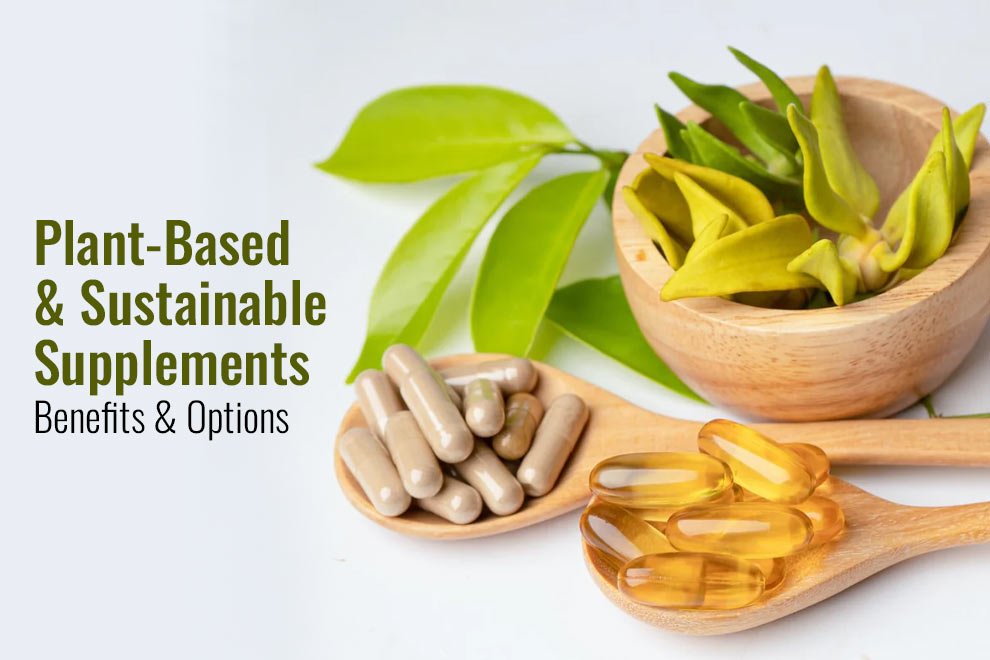Plant-based supplements are gaining popularity as most people are now looking for ethical and eco-conscious options for health and well-being. Factors making people choose plant-derived supplements include:
- Rising awareness of the benefits of plant-based diets.
- Growing preference for natural and sustainable products.
- Desire to avoid animal-derived ingredients.
Due to these reasons, people are more inclined to sustainable supplement options. But what are plant-based supplements?
These are dietary supplements derived from plant-based sources, including fruits, vegetables, nuts, seeds, algae, spices, herbs, and other botanical ingredients. The best plant-derived formulations, like ACTIVIT, deliver vitamins, minerals, and other nutrients without using any animal-derived ingredients.
Conventional or animal-based ingredients come from fish, meat, or dairy products. Still, plant-based supplements may use algae for omega-3, lichen for vitamin D3, and herbal adaptogens like ashwagandha and rhodiola for other nutrients. This makes them suitable for everyone, including those following a vegan or a vegetarian diet.
Let’s explore the benefits of vegan multivitamins!
Health Benefits of Plant-Based Supplements
Vegan multivitamins have the following benefits:
- Heart Health: Some animal-based supplements may contain saturated fats, while plant-based options provide heart-friendly omega-3 fatty acids derived from algae. Thus, these healthy fats can help lower cholesterol, blood pressure, and the risk of heart disease.
- Nutrient Rich: They are generally more nutrient-rich as they can provide a broader range of phytonutrients, antioxidants, and fiber, along with vitamins and minerals, compared to animal-based options.
- Digestive Health: Many people find vegan multivitamins easier to digest. That is because some contain natural fiber and plant compounds that support healthy digestion and bowel movements, which may help reduce constipation.
- Weight Management: These supplements often contain fiber, protein, and low-calorie ingredients, which support healthy digestion and promote satiety, thereby helping with weight management.
- Lower Toxins: Plant-derived supplements generally have lower toxins as they contain fewer or no heavy metals, antibiotics, and synthetic additives compared to some animal-derived products.
- Blood Sugar Balance: Plant-based supplements contain extracts from healthy natural sources like berberine, cinnamon, bitter melon, and others that help regulate glucose metabolism and support healthy insulin signaling, consequently, enhancing blood sugar control.
How to Choose Plant-Based Supplements
Though sustainable supplements are considered healthy, not all are created equal. Before choosing a plant-based supplement, consider these factors:
- Look for brands that follow Good Manufacturing Practices (GMP) and hold certifications like ISO to ensure consistency and safety.
- Choose supplements certified by USP or NSF for purity and potency, or with ingredients reviewed for safety by JECFA.
- Get a supplement that follows the country’s safety, quality, and regulatory standards — for example, the DRAP-registered supplement, like ACTIVIT.
- Go for supplements like ACTIVIT that contain bioavailable plant-derived nutrient forms, such as L-methylfolate from leafy greens instead of synthetic folic acid, and vitamin C as liposomal vitamin C (plant-derived).
- Try to avoid fillers, binders, artificial colors, and additives in formulations, which can dilute the benefits of the supplements.
- Select an algae-derived omega-3 with essential EPA and DHA if you want the benefits of omega-3 fatty acids without relying on fish sources.
Plant-Based Vitamin and Mineral Forms
Generally, vegan forms of vitamins and minerals include:
- Vitamin A as Beta-carotene – derived from carrots, sweet potatoes, and algae.
- Vitamin C as L-Ascorbic Acid or Liposomal Vitamin C – from corn, acerola cherries, camu camu, and other fruits.
- Vitamin D3 as Cholecalciferol – from lichen.
- Vitamin K1 as Phylloquinone – from leafy greens like spinach or kale.
- Vitamin K2 as Menaquinone 7 – from fermented soy (natto) or chickpeas.
- Iodine – from kelp and other seaweeds.
- Omega-3 (EPA and DHA) – from microalgae.
Most vegan supplements and plant-based vitamins are derived from these natural sources.
Fitting Them into Your Lifestyle
Plant-based supplements can also support your health goals, from boosting immunity and energy to improving skin health and hormonal balance. However, plant-based multivitamins work well with a nutrient-rich diet. Therefore, you should take plant-derived supplements along with a healthy diet consistently with breakfast in the morning for optimal results.
Plant-Based Supplements or Animal-Derived?
- Most people now prefer vegan vitamins and minerals because of their natural origin, sustainable sourcing, and minimal processing compared to animal-based supplements.
- Unlike animal-derived, natural plant-based supplements provide a broader spectrum of beneficial compounds like phytonutrients and antioxidants.
- Compared to animal-based options, most plant-based multivitamins do not include allergens, such as dairy, fish, or shellfish, making them suitable for everyone, including vegans and vegetarians.
- Vegan nutrients sometimes surpass animal-derived counterparts in bioavailability, such as l-methylfolate, which is more bioavailable than folic acid.
Final Thoughts
Today, many people are switching to plant-derived supplements because they promote both their health and the health of the planet. Plant-based formulations are clean and healthy, providing nutrient-rich support free from animal-derived ingredients and synthetic additives. With so many options available on the market, you can choose vegan vitamin and mineral forms in a supplement that suits your health needs for optimal absorption and effectiveness.
Also Read: Do Collagen Supplements Really Work? Debunking Myths and Exploring the Science










